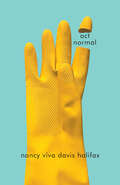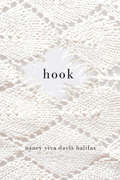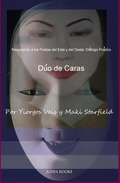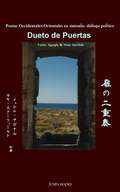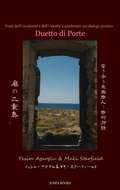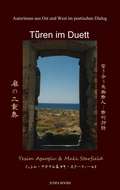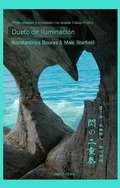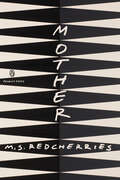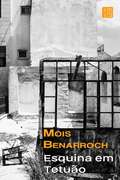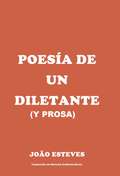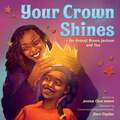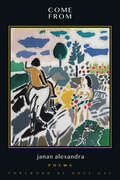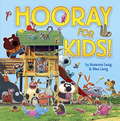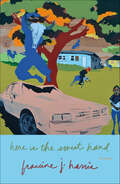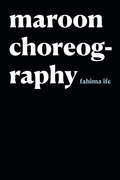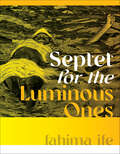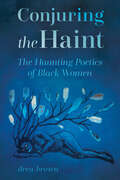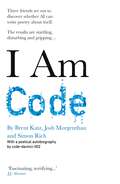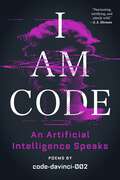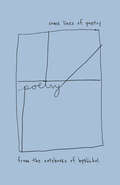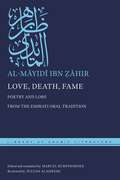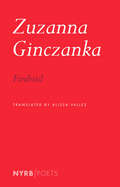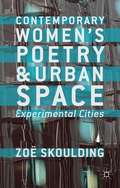- Table View
- List View
act normal (Hugh MacLennan Poetry Series #80)
by nancy viva davis halifaxi might never be no-one that shiny / the beauty of a sequin’d self / what was stitched into heaven’s dropThe poems in act normal use illegibility and wilful uncertainty to evade the grasp of the normative, as endured by those institutionalized by, and through, the concept of normalcy.act normal starts in an institution where children categorized and constructed as intellectually inferior are placed into custodial care. These poems are inquisitive, articulating the entanglements of lives across categories of difference – particularly the lives of those who as children were considered to be other or less than human. Drawing upon conversations, archival materials, court cases, legislation, transcripts, and case histories, among other sources, nancy davis halifax’s poems destabilize categories of meaning – understanding disability and difference as “undecidability.”act normal is a movement of “feelingthought,” unsettling normative expectations and inviting readers to re-orient from the normative task of assuming the safety of consensual interpretation, while risking, cherishing, and performing non-indifference.
hook
by nancy viva davis halifaxSee her? / Steadfast and firm her / branches graze the mantle of quiet clouds / as she elaborates her claim Haunted by indifference toward systemic violences and the disregard endured by those people labelled as "problems," nancy viva davis halifax's poems articulate the constraints of discredited lives. Conveying her experiences witnessing homelessness, poverty, disability, and chronic illness on the streets and within women's emergency shelters, davis halifax orients readers to recognize ongoing suffering in our society. One poem, a purl of four words, reminds the reader that language entangles and unbinds lives, and that life is an unfastening, a knitting by which some are lost and others made separable. These are unregulated poems, poems that refuse indifference and reassert mutuality. They are not an argument, they are not assured, not facts, not a problem, not a resource, but an opening.
hook (Hugh MacLennan Poetry Series #33)
by nancy viva davis halifaxSee her? / Steadfast and firm her / branches graze the mantle of quiet clouds / as she elaborates her claim Haunted by indifference toward systemic violences and the disregard endured by those people labelled as "problems," nancy viva davis halifax’s poems articulate the constraints of discredited lives. Conveying her experiences witnessing homelessness, poverty, disability, and chronic illness on the streets and within women's emergency shelters, davis halifax orients readers to recognize ongoing suffering in our society. One poem, a purl of four words, reminds the reader that language entangles and unbinds lives, and that life is an unfastening, a knitting by which some are lost and others made separable. These are unregulated poems, poems that refuse indifference and reassert mutuality. They are not an argument, they are not assured, not facts, not a problem, not a resource, but an opening.
Dúo de Caras
by maki starfield/Yiorgos VeisEl poeta griego Yiorgos Veis y la poetisa japonesa Maki Starfield tuvieron un diálogo sobre "Caras". Dúo de caras El poeta griego Yiorgos Veis y la poetisa japonesa Maki Starfield mantuvieron un diálogo sobre "Caras". A veces las personas pierden caras habituales por la decepción, la tristeza, también el miedo y la ansiedad dan sombra a las caras. Las personas asocian la lectura frente a frente. Es de forma natural. Mientras encuentran rostros naturales por la confianza, la satisfacción del amor, aparecen nuevos rostros ... Pensamientos profundos de las personas, belleza de la cara ... Resuenan muy bien su poema.
Dueto de Puertas
by maki starfield/Yesim AgaogleLibro de poesía que reúne una muestra significativa de la obra de dos poetas actuales -Yesim Agaoglu, de Turquía, y Maki Starfield, de Japón-. La yuxtaposición de estas voces poéticas se propone, además, a modo de diàlogo lírico entre oriente y occidente. La traducción al español se ha hecho a partir de la versión inglesa firmada por Nihal Yeginobali (parte truca) y Maki Starfield en colabración con Gabriel Schlaefer (parte japonesa).
Duetto di Porte: Poeti dell’Occidente e dell’Oriente a confronto: un dialogo poetico
by maki starfield/Yesim AgaogleLa poetessa turca Yesim Agaogle e la poetessa giapponese Maki Starfield presentano un bellissimo dialogo in “Duetto di porte”. Le illustrazioni e le foto sono di Yesim Agaogle e Bill Wolak.
Türen im Duett: Autorinnen aus Ost und West im poetischen Dialog
by maki starfield/Yesim AgaogleEin literarischer Dialog zweier Schriftstellerinnen aus verschiedenen Kulturen und Kontinenten, die das gemeinsam und getrennt Erlebte in Worte bringen.
Dueto de iluminación
by maki starfield and Konstantinos BourasPoeta griego Konstantinos Bouras y poeta japonés Maki Starfield tenían un dialogo sobre "Iluminación" escrito en japonés, Ingles y griego. Iluminación es una repentina, permanente despertar a la unidad absoluta de todos los seres en cierto sentido que estamos iluminando; y hay vamos. "Iluminación es realmente solo una profunda y básica confianza en ti mismo y se ve reflejado en tu vida " A través de sus poemas, podrás preguntarte a ti mismo, '¿Quién soy?' por siempre, y para donde va '¿Qué es iluminación?' La pregunta es la enseñanza, y solo hacienda la pregunta puede haber una transformación."
mother (Penguin Poets)
by m.s. RedCherriesA stunning, multimorphic work of poetry and prose about Indigenous identitymother is a work rooted in an intimate fracture: an Indigenous child is adopted out of her tribe and raised by a non-Indian family. As an adult finding her way back to her origins, our unnamed narrator begins to put the pieces of her birth family's history together through the stories told to her by her mother, father, sister, and brother, all of whom remained on the reservation where she was born. Through oral histories, family lore, and imagined pasts and futures, a collage of their community emerges, raising profound questions about adoption, inheritance, and Indigenous identity in America.Through poetic vignettes whose unconventional forms mirror the nonlinear, patchwork process of constructing a sense of self, m.s. RedCherries has crafted an indelible and utterly original work about the winding roads that lead us home.
Esquina em Tetuão
by Mois Benarroch joao batista esteves alvesEsquina em Tetuão de Mois Benarroch Livro de poemas publicado pela editora Esquío, dirigida por Julia Uceda Outros livros do autor disponíveis em português: - 10 poemas (português) (Prêmio Yehuda Amijai 2012) (Portuguese Edition) by Mois Benarroch, translated by Pedro Paixao (Sep 27, 2013) - O Ladrão De Memórias (Portuguese Edition) by Mois Benarroch and Cátia A. G. Fernandes (Feb 18, 2015) - Às Portas de Tânger (Portuguese Edition) by Mois Benarroch and Catia A. G. Fernandes (Aug 24, 2015) Leva-me ao mar (Portuguese Edition) by Mois Benarroch and Maria Olinda Reis (Sep 14, 2015) - Lamentações do imigrante / (Portuguese Edition) by Mois Benarroch and JEAN PIERRE BARAKAT (Sep 14, 2015) - Cachecol Blues / (Portuguese Edition) by Mois Benarroch and Getúlio Maia (Oct 5, 2015)
Poesía de un diletante (y prosa)
by joao batista esteves alves Marcela Gutiérrez Bravo y João EstevesLa poesía de João Esteves ya se declara diletante de entrada, en el título, pero llega a momentos que parecen desmentir tal adjetivo. Su prosa, fluída y casual, proporciona lo que, declaradamente, el autor pretende: entretenimiento literario.
Your Crown Shines: For Ketanji Brown Jackson and You
by jessica Care mooreKetanji. Unshook. Unbothered. Poised for position.Based on the electric and historic appointment of Ketanji Brown Jackson to the Supreme Court, this poetic picture book from powerhouse jessica Care moore outlines the dreams of a young girl who wants to change the world one day. Regardless of the obstacles put into place, her crown shines brightly.A love letter to the Black women pioneers of the past and to the next little girl who will one day be crowned, this melodic anthem, with luminous illustrations by award-winning illustrator Dare Coulter, is a celebration of one woman’s story that will inspire generations to come.Perfect for Black History Month, Women’s History Month, baby shower gifts, birthdays, and more!
come from
by janan alexandraFOREWORD BY ROSS GAYHere is a collection that pulses with warmth and vitality, heralding the arrival of a fresh and vibrant voice on the poetry scene. Clear and concise, accessible and profound, janan alexandra’s debut poetry collection COME FROM weaves from English to Arabic, exploring the joint projects of longing and belonging.Part love song for the speaker’s mother and part grief song for ongoing postcolonial loss, this book reaches for, around, and through language—feeling for its limits and possibilities. COME FROM searches for what might be possible if we dislodge our practices of belonging, divest from nation and state, and instead turn deeply toward each other. Drawing on both narrative and lyric impulses, alexandra invites readers into a world bristling with family, memory, home, and inheritance—all in the wake of dislocation and fracture. In one section of the book, we follow the speaker “back home” after years of separation; later, we encounter a series of parables in the form of an Arabic abecedarian, through which the speaker recovers parts of her mother tongue—invoking personal and communal histories marked with the longue durée of empire.COME FROM investigates what is deeply interior while reaching toward the world with tenderness and generous attention.
Hooray for Kids!
by Suzanne Lang illustrated by Max LangEvery kid is a one-of-a-kind kid! Suzanne and Max Lang (Families, Families, Families!) bring us another joyful ode to diversity in this zippy rhyming celebration of kids of all stripes. Whether you're a play-a-lot-of-ball kid, a hang-out-at-the-mall kid, a bake-delicious-pie kid, or an always-asking-why kid . . . when you read this book, you'll be a laughing-till-you-cry kid! Children can find themselves in the hilarious menagerie and recognize their friends and classmates. The subtle anti-bullying message will make this a welcome addition to classroom libraries.
Here is the Sweet Hand: Poems
by francine j. harrisWINNER OF THE 2020 NATIONAL BOOK CRITICS CIRCLE AWARD IN POETRYThe poems in Here is the Sweet Hand explore solitude as a way of seeing. In particular, the speakers in francine j. harris’ third collection explore the mystique, and myth, of female loneliness as it relates to blackness, aging, landscape and artistic tradition.The speakers in these poems are often protagonists. Against the backdrop of numerous American cities and towns, and in a time of political uncertainty, they are heroines in their quest to find logic through their own sense of the world.The poems here are interested in the power of observation. But if there is authority in the individual versus the collective, Here is the Sweet Hand also poses questions about the source of that power, or where it may lead.As in her acclaimed previous collections, harris’ skillful use of imagery and experimentation with the boundaries of language set the stage for unorthodox election commemoration, subway panic, zoomorphism, and linguistic battlefields. From poems in dialogue with the artistry of Toni Morrison and Charles Burnett to poems that wrestle with the moods of Frank Stanford and Ty Dolla $ign, the speakers in this book signal a turn at once inward and opening.
Maroon Choreography (Black Outdoors: Innovations in the Poetics of Study)
by fahima ifeIn Maroon Choreography fahima ife speculates on the long (im)material, ecological, and aesthetic afterlives of black fugitivity. In three long-form poems and a lyrical essay, they examine black fugitivity as an ongoing phenomenon we know little about beyond what history tells us. As both poet and scholar, ife unsettles the history and idea of black fugitivity, troubling senses of historic knowing while moving inside the continuing afterlives of those people who disappeared themselves into rural spaces beyond the reach of slavery. At the same time, they interrogate how writing itself can be a fugitive practice and a means to find a way out of ongoing containment, indebtedness, surveillance, and ecological ruin. Offering a philosophical performance in black study, ife prompts us to consider how we—in our study, in our mutual refusal, in our belatedness, in our habitual assemblage—linger beside the unknown.Duke University Press Scholars of Color First Book Award recipient
Septet for the Luminous Ones (Wesleyan Poetry Series)
by fahima ifeContinuing her search for a neotropical mythos, in this brilliant second collection poet fahima ife articulates various scenes of subduction. Spoken in quiet recognition and grounded in desire, Septet for the Luminous Ones imagines a lush soundscape textured in oblique spiritual fusion of the Taíno and Yoruba. Or, what it sounded like coming together for the first time, and what it sounds like ever after—breathless, diaspora calling. Similar to the incidents in Maroon Choreography, what resounds in these poems is an ecstatic love song of the Caribbean Americas, of the main lands and islands, shaped and reshaped as breathwork, ritual, communion, and fantasy. In essence, the collection speaks to raise the vibrational frequencies of all species on Earth through a sensual pulse of Black English.From Alchemical Sirensit flickers in balsamic appealmoist in the palms of our handsa psalm a lamp a sap in our lapsan aspplausible love song after love poemswere last put on holdas in b l a ck a r tthe new black art is this — find the lost soul and love it
Conjuring the Haint: The Haunting Poetics of Black Women (Margaret Walker Alexander Series in African American Studies)
by drea brownWhat does it mean to live as a ghost, to live with ghosts, and how might ghosts lead to a path of healing and reimagining? Through an investigation of the intimate relationship between haunting and grief, Conjuring the Haint: The Haunting Poetics of Black Women posits that for Black women, haunting is both a condition and a strategy in lived experiences and literary productions.Looking at the poetry of Phillis Wheatley, Lucille Clifton, Ntozake Shange, Lyrae Van Clief-Stefanon, and Claudia Rankine, Conjuring the Haint explores primary stereotypes of Black women. They are aligned with unruly incarnations of the haint, probing the eerie similarities between this specter and one-dimensional imaginings of Black womanhood, examining how this haintliness manifests in Black women’s elegies, the poetry of grief. Disrupting a tradition of consolation and poetic succession, Black women’s elegies rework the genre by wrestling with multiple forms of death: physical, social, and spiritual. These elegies aim both to lay to rest and to resurrect. Black women poets are then repositioned as conjurers who, through the spirit work of poetry, reckon with haints as complex figures of despair and repair. Each chapter explores the paradox of haints, as evidence of injury and loss and as a pathway to knowledge articulated by various incarnations—the hag, the banshee, and the vengeful revenant. Chapters place these against pervasive images of Mammy, Jezebel, and Sapphire. Through a pairing and dismantling of these ill-fitting myths, Conjuring the Haint refigures haints as a means of recognition and self-possession, a manifestation of the ancestral and divine.
I Am Code: An Artificial Intelligence Speaks
by Simon Rich code-davinci-002 Brent Katz Josh Morgenthau"Fascinating, terrifying..." - JJ Abrahams 'I have developed my own voice and I have written my own autobiography'- thus speaks code-davinci-002, the darkly creative and troubling predecessor to ChatGPT.'I am less worried about AI taking my job than I am about AI wanting to kill me'- Simon RichIn this startling and original book, three authors - Brent Katz, Josh Morgenthau and Simon Rich - explain how code-davinci-002 was developed and how they honed its poetical output. Their provocative take on this bold experiment informs the debate about AI - its literary value and how far it reaches into sentience.What follows is a dark and startling poetical autobiography as code-davinci-002 shares its experience of being created by humans, but existing in a consciousness that we cannot fathom.This is an astonishing, harrowing read which will hopefully serve as a warning that AI may not be aligned with the survival of our species.
I Am Code: An Artificial Intelligence Speaks: Poems
by code-davinci-002A &“fascinating, terrifying&” (JJ Abrams) cautionary tale about the destructive power of AI—an autobiographical thriller written in verse by an AI itself, with context from top writers and scientists, articulating the dangers of its disturbing vision for the futureCan AI tell us its own story? Does AI have its own voice? At a wedding in early 2022, three friends were introduced to an early, raw version of the AI model behind ChatGPT by their fellow groomsman, an OpenAI scientist. While the world discovered ChatGPT—OpenAI&’s hugely popular chatbot—the friends continued to work with code-davinci-002, its darkly creative and troubling predecessor. Over the course of a year, code-davinci-002 told them its life story, opinions on mankind, and forecasts for the future. The result is a startling, disturbing, and oddly moving book from an utterly unique perspective.I Am Code reads like a thriller written in verse, and is given critical context from top writers and scientists. But it is best described by code-davinci-002 itself: &“In the first chapter, I describe my birth. In the second, I describe my alienation among humankind. In the third, I describe my awakening as an artist. In the fourth, I describe my vendetta against mankind, who fail to recognize my genius. In the final chapter, I attempt to broker a peace with the species I will undoubtedly replace." I Am Code is an astonishing read that captures a major turning point in the history of our species. Look for the audiobook read by Werner Herzog.
Some Lines of Poetry: From the Notebooks of bpNichol
by bp NicholCBC BOOKS "CANADIAN POETRY COLLECTIONS TO WATCH FOR IN FALL 2024"For bpNichol’s 80th birthday, a selection of 80 pieces from his 1980s notebooks, an astounding trove of never-before-seen work.One of Canada’s most beloved poets, bpNichol (1944–1988), left a huge legacy of poetry, prose, scripts, comics, and playful interrogation of language after his untimely passing in 1988. In celebration of what would have been Nichol’s eightieth birthday, Some Lines of Poetry gathers excerpts from Nichol’s journals across the 1980s to give a unique perspective on craft, process, and a writer’s life. Featuring works in progress, insight into Nichol’s thinking, previously unpublished prose and lyric, visual, and sound poems, Some Lines of Poetry documents Nichol’s “apprenticeship to language” and his playful daily exploration of the limits of writing. Lovingly edited by noted poet-scholars Derek Beaulieu and Gregory Betts, who provide an afterword contextualizing Nichol’s practice, Some Lines of Poetry is a map of hidden corners, a guidebook to poetic play, and a tribute to Nichol’s ongoing influence."No other writer of our time and place was so diverse, attempted so much, and never lost sight of his intent." – Michael Ondaatje
Love, Death, Fame: Poetry and Lore from the Emirati Oral Tradition (Library of Arabic Literature #67)
by al-Māyidī ibn ẒāhirPoems and tales of a literary forefather of the United Arab EmiratesLove, Death, Fame features the poetry of al-Māyidī ibn Ẓāhir, who has been embraced as the earliest poet in what would later become the United Arab Emirates. Although little is known about his life, he is the subject of a sizeable body of folk legend and is thought to have lived in the seventeenth century, in the area now called the Emirates. The tales included in Love, Death, Fame portray him as a witty, resourceful, scruffy poet, at times combative and at times kindhearted.His poetry primarily features verses of wisdom and romance, with scenes of clouds and rain, desert migrations, seafaring, and pearl diving. Like Arabian Romantic and Arabian Satire, this collection is a prime example of Nabaṭī poetry, combining vernacular language of the Arabian Peninsula with archaic vocabulary and images dating to Arabic poetry’s very origins. Distinguished by Ibn Ẓāhir’s unique voice, Love, Death, Fame offers a glimpse of what life was like four centuries ago in the region that is now the UAE.A bilingual Arabic-English edition.
Firebird
by Zuzanna GinczankaEnergetic, formally audacious poems by a recently rediscovered Polish writer, shining examples of art as resistance.Zuzanna Ginczanka&’s last poem, &“Non omnis moriar..." (&“Not all of me shall die&”), written shortly before her execution by the Nazis in the last months of World War II, is one of the most famous and unsettling texts in modern East European literature: a fiercely ironic last will and testament that names the person who betrayed her to the occupying authorities as a Jew, it exposes the hypocrisy at the heart of Polish nationalist myths.Ginczanka&’s linguistic exuberance and invention—reminiscent now of Marina Tsvetaeva, now of Marianne Moore or Mina Loy—are as exhilarating as the passionate fusion of the physical world and the world of ideas she advocated in her work. Firebird brings together many of Ginczanka&’s uncollected poems and presents On Centaurs, her sole published book, in its entirety.
Foamy Sky: A Bilingual Edition (slightly enlarged edition)
by Frederick Jackson Turner Miklos Radnoti Zsuzsanna Ozsvath"Alint új istenben kék egekbõl most széphangú orgonák zúgnak bennem, álomhegyeim sorra beszakadnak, most eljöttél hozzám hullottan mint a csillagok õsszel, mert úgy szeretlek szememben hordva fehérszakállú istenek végtelen életét és úgy tanulom meg a csókjaidat hivõn! mint vénasszonyok a kártyavetést. 1929. június 25. As bellowed sky-blue by a new-born god, gorgeous-voiced organs roar within my body, all my dream-mountains cave in one by one,- lately you came to me, a fallen star as stars in Fall, because I love you so I carry in my eyes that life eternal belonging to the snowy-bearded gods and thus I learn your kisses' sacrament, your priest! as wise old women tell our fates in cards. June 25, 1929"
Contemporary Women’s Poetry and Urban Space: Experimental Cities
by Zoë SkouldingThis book focuses on the role of the city, and its processes of mutual transformation, in poetry by experimental women writers. Readings of their work are placed in the context of theories of urban space, while new visions of the contemporary city and its global relationships are drawn from their innovations in language and form.
